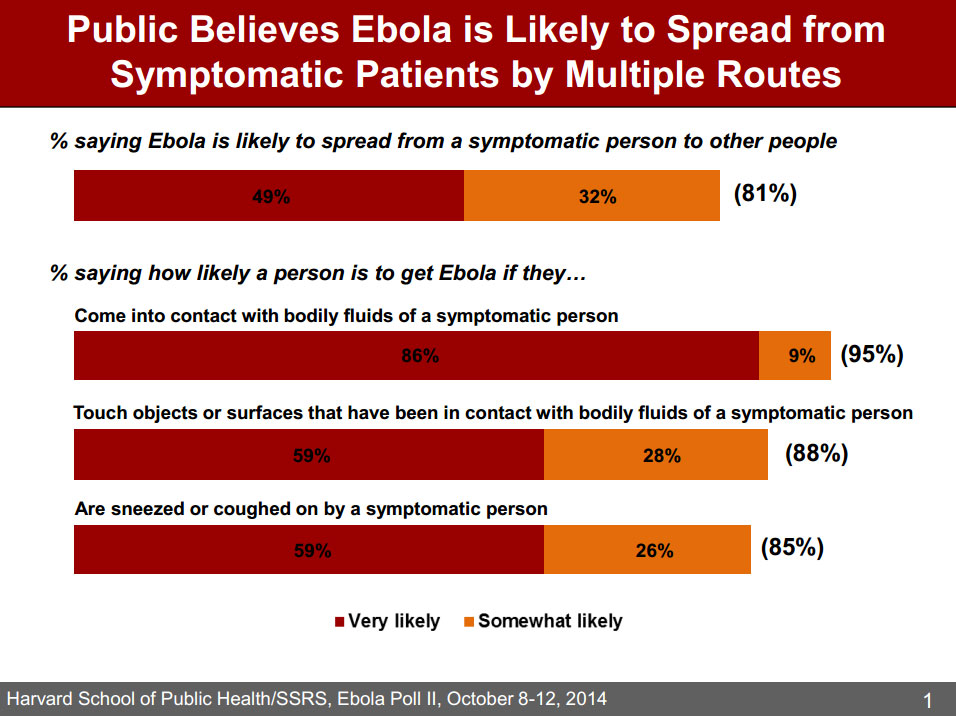Advertisement
Harvard Poll On Ebola Risk Finds Public Dazed And Very Confused
By Richard Knox
Americans are seriously confused about how Ebola spreads. And it’s no wonder.
A new national poll from the Harvard School of Public Health finds that nearly 9 out of 10 Americans think someone can catch Ebola if an infected person sneezes or coughs on them.
Not so, according to all health authorities and 38 years of research on this virus. But maybe people can’t be blamed for thinking Ebola can be spread through the air as they see powerful images day after day of health workers clad in head-to-toe protective coverings and face masks.
And there’s little to no possibility that Ebola will mutate into a virus easily spread by aerosol droplets, like influenza or SARS, for reasons that Laurie Garrett of the Council on Foreign Relations recently pointed out in The Washington Post.
Similarly, all the attention on the imported Ebola case of a Liberian man in Dallas and subsequent infection of two of his nurses (so far) is apparently leading many Americans to overestimate their risk of getting the virus.
In contrast, the great majority (80 percent) think they’d survive Ebola if they got immediate care. That’s probably right — though no sure thing.

The Harvard poll, conducted between last Wednesday and Sunday, finds that a little over half of Americans worry there will be a large outbreak of Ebola in this country over the coming year.
More than a third worry they or someone in their immediate family will get Ebola.
Again, such fears are totally understandable given the saturation media coverage of such a scary virus. But — despite the worrisome lapses in infection control in Dallas — there’s no reason yet to anticipate widespread person-to-person-to-person spread of Ebola in America.
The reason: Despite (perhaps inevitable) slips, the vigilance, the resources and the ability to track and isolate infected people in this country (under force of law, if necessary) are light-years removed from Liberia, Sierra Leone and Guinea.
But what if you do get a significant exposure to Ebola — that is, come in contact with vomit, blood or feces from an infected person — or a surface contaminated with infected bodily fluids? Would you be able to stay in home quarantine for three weeks until the risk of your infection is past?
Nearly 6 in 10 Americans say that would be difficult for them. (No kidding!) That might be ominous in a situation when millions of Americans could be asked to observe quarantine — say, in the event of a killer bird-flu pandemic, which remains possible someday.
But will Ebola outbreaks put many Americans to that 21-day quarantine test? Not a chance.
Another poll, just released by the Kaiser Family Foundation, has some interesting differences from the Harvard poll’s results.
Roughly comparable percentages worry that they or a family member will contract Ebola (45 percent in the KFF poll, 38 percent in the Harvard poll). But far fewer of the KFF respondents (34 percent) think the virus can be spread by coughing or sneezing than among the Harvard respondents (85 percent).
Only 22 percent in the KFF poll think it’s likely the United States will experience a widespread Ebola outbreak, versus about half of those in the Harvard poll.
The Kaiser poll also has some additional data on how confident Americans feel in the ability of health officials and hospitals to contain Ebola. Nearly three-quarters have confidence in the Centers for Disease Control and Prevention. Somewhat fewer have confidence in their local hospitals (64 percent) or health departments (62 percent).
The KFF poll was taken between last Wednesday and Tuesday of this week, before some respondents knew of the diagnosis of the second Dallas nurse’s infection and the revelation that she had the green light from the CDC to take a commercial flight.
More Coverage: